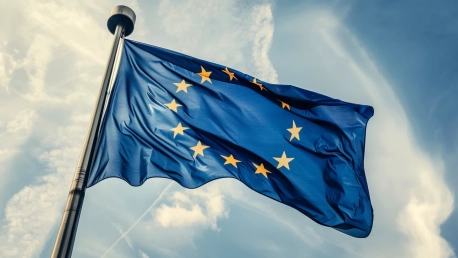The political winds in Europe have changed course, presenting a tumultuous forecast for climate policy following the 2024 European Parliament elections. Swept into power are a significant number of right-leaning legislators, many of whom hold skeptical views on climate change and prioritize nationalist economic agendas over collective environmental action. This conservative tide poses formidable challenges to the EU’s ambitious Green Deal, which envisions a net-zero emissions continent by 2050. As this newly configured Parliament stands at the threshold of policymaking, the durability of Europe’s green aspirations will be rigorously tested—framing a narrative not just about the environment, but the very nature of progress in a divided Europe.
Challenging the EU Green Deal
The EU Green Deal, once considered a shining beacon of Europe’s commitment to the planet, is encountering stiff headwinds. The new guard of right-wing policymakers is casting a critical eye on various aspects of the Deal, questioning the viability of renewable energy projects and their impact on traditional industries and land use. In France, the expansion of onshore wind farms is caught in the crosshairs of controversy, while Italy debates over solar photovoltaic installations roil against the backdrop of agricultural priorities.The next Commission, which may continue under Ursula von der Leyen’s stewardship if she is re-elected, finds itself at the helm of a Union at a crossroads. With the environmental commitments of the past clashing with the shifting political sentiments of the present, a delicate balancing act is required—one that must reconcile the urgency of environmental imperatives with a rising tide of political opposition that favors economic nationalism and the reevaluation of global competitiveness.
Modulating Climate Targets and Policies
Economic strain felt by citizens across the Union is casting doubt on the prescribed path to combat global warming. The ripples of inflation and the demands for practical solutions are pressuring policymakers to consider tempering the EU’s climate targets. The public’s appetite for transition technologies like electric vehicles and heat pumps is matched by an expectation of affordability, as well as skepticism toward being coerced into adopting technologies seen as expensive or premature.Moreover, the proposed revisions such as softening the 2040 greenhouse gas targets and rethinking the 2035 ban on new internal combustion engine vehicles are a testament to the growing call for pragmatism. The looming policy debate encapsulates not just the struggle to meet environmental goals, but moreover, to chart a sustainable economic course that does not alienate the citizenry or risk their livelihoods amidst a transformative era.
Striving for Global Competitiveness
In the marketplace of global influence, Europe’s green industry refuses to be left in the dust. Amidst the policy ping-pong, there is a clarion call for concerted efforts to support the manufacture and advancement of energy transition technologies—wind turbines, solar panels, electrolyzers, and batteries, to name a few. This sector is seeking a firm commitment from the EU to level the playing field to bolster its chances against formidable competitors like China and the US.Creating a regulatory environment that fuels innovation while trimming excessive bureaucracy is essential for maintaining Europe’s green edge. Industry voices argue for not just environmental consciousness, but strategic economic support, signifying the gravity of the situation: how Europe balances environmental responsibility with economic vigor will have profound consequences, both internally and on the world stage.
Voter Perspectives on the Energy Transition
European voters are raising their voices for a just energy transition, one that respects both environmental integrity and the competitive standing of the continent. The message from the populace is clear: green policies must not impinge upon economic growth and vitality. Tanja Gonner of the German business association BDI articulates a common sentiment, advocating for measures that secure the sustainability of European enterprises as much as the environment.These evolving perspectives underline the complexity of advancing climate policy amidst a changing political landscape. As Europe navigates through these currents, the goalpost lies in harmonizing green goals with economic realities—creating policies that assure environmental progress does not come at the detriment of its own industries and workforce.
Revising Legislations Amidst Political Tides
Rooted in past commitments to the Green Deal and aims for a carbon-neutral 2050, Europe’s environmental momentum shows signs of persistence. Nevertheless, with a Parliament that’s been dealt a new hand, subtle and perhaps substantial edits to the legislative fabric could emerge. Legislators may seek to introduce amendments to existing laws that weave in current economic and sociopolitical considerations, potentially diluting the existing measures.The legislative battles to come will define the pace and extent of the Green Deal’s objectives. As Europe’s decision-makers grapple with divergent views and try to strike an accord, the ultimate shape of climate policies will depend largely on their capacity to build consensus, amidst a tableau of multifactorial, at times conflicting, interests.
Commission Appointments and Policy Direction
With the dramatic shift in Europe’s political landscape post the 2024 European Parliament elections, there are new implications for climate strategies. A surge of right-leaning lawmakers, many doubtful of climate change, have ascended to power. This group tends to value national economic pursuits over collective environmental measures, putting them at odds with the EU’s ambitious goals for a greener future. The Green Deal, which aims for a carbon-neutral continent by 2050, is at stake.Facing an assembly replete with conservative voices, the resilience of Europe’s commitment to combat climate change will undergo a rigorous examination. These legislators are now poised to shape policy, and their decisions will signal more than environmental action—they will contour the very trajectory of progress amidst a Europe wrestling with unity. How this parliament navigates such challenges will be telling, as they stand at a critical juncture where the conviction of Europe’s green intentions could clash with rising nationalist concerns.









